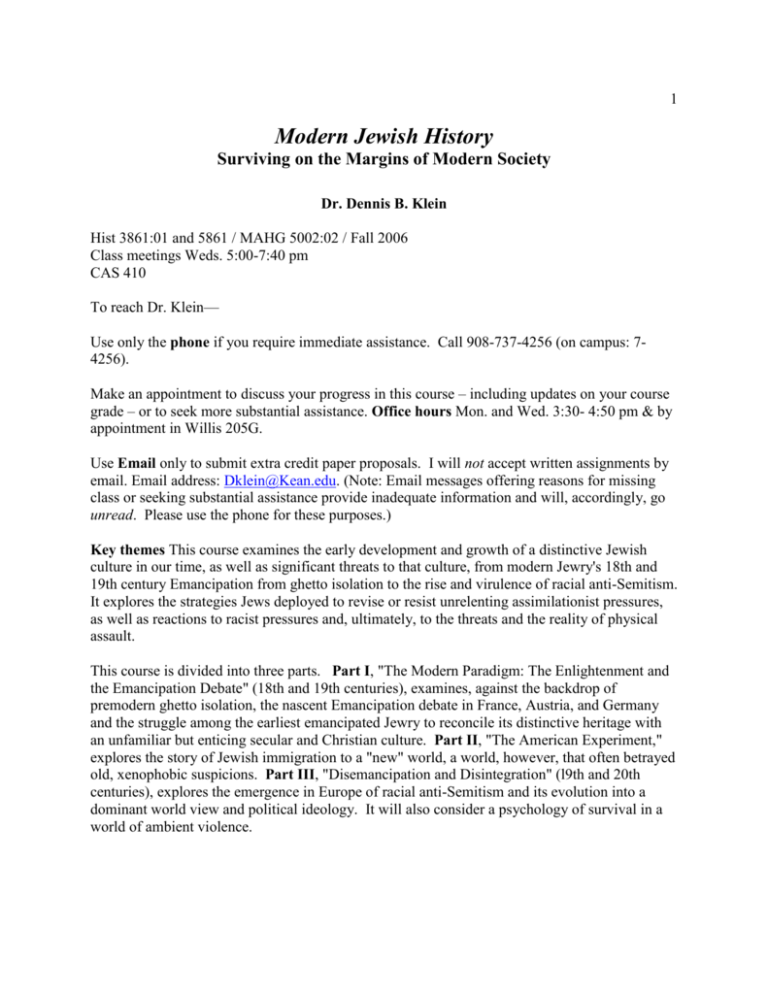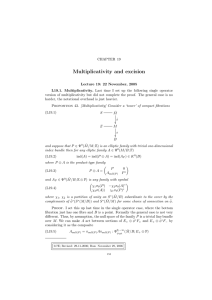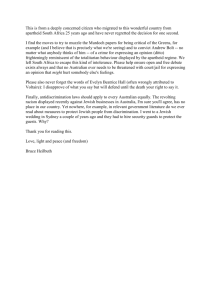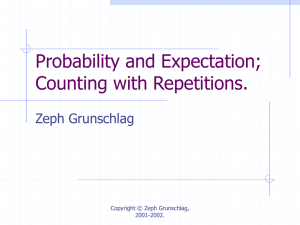
1
Modern Jewish History
Surviving on the Margins of Modern Society
Dr. Dennis B. Klein
Hist 3861:01 and 5861 / MAHG 5002:02 / Fall 2006
Class meetings Weds. 5:00-7:40 pm
CAS 410
To reach Dr. Klein—
Use only the phone if you require immediate assistance. Call 908-737-4256 (on campus: 74256).
Make an appointment to discuss your progress in this course – including updates on your course
grade – or to seek more substantial assistance. Office hours Mon. and Wed. 3:30- 4:50 pm & by
appointment in Willis 205G.
Use Email only to submit extra credit paper proposals. I will not accept written assignments by
email. Email address: Dklein@Kean.edu. (Note: Email messages offering reasons for missing
class or seeking substantial assistance provide inadequate information and will, accordingly, go
unread. Please use the phone for these purposes.)
Key themes This course examines the early development and growth of a distinctive Jewish
culture in our time, as well as significant threats to that culture, from modern Jewry's 18th and
19th century Emancipation from ghetto isolation to the rise and virulence of racial anti-Semitism.
It explores the strategies Jews deployed to revise or resist unrelenting assimilationist pressures,
as well as reactions to racist pressures and, ultimately, to the threats and the reality of physical
assault.
This course is divided into three parts. Part I, "The Modern Paradigm: The Enlightenment and
the Emancipation Debate" (18th and 19th centuries), examines, against the backdrop of
premodern ghetto isolation, the nascent Emancipation debate in France, Austria, and Germany
and the struggle among the earliest emancipated Jewry to reconcile its distinctive heritage with
an unfamiliar but enticing secular and Christian culture. Part II, "The American Experiment,"
explores the story of Jewish immigration to a "new" world, a world, however, that often betrayed
old, xenophobic suspicions. Part III, "Disemancipation and Disintegration" (l9th and 20th
centuries), explores the emergence in Europe of racial anti-Semitism and its evolution into a
dominant world view and political ideology. It will also consider a psychology of survival in a
world of ambient violence.
2
Required reading All books below are available in the University Bookstore
Paul Johnson, A History of the Jews.
Paul R. Mendes-Flohr and Jehuda Reinharz, eds., The Jew in the Modern World: A
Documentary History (JMW).
Dennis B. Klein, Modern Jewish History: Surviving on the Margins of Modern Society /
A Source Reader (SR).
Philip Roth, The Plot Against America.
Adolf Hitler, Mein Kampf.
Simon Wiesenthal, The Sunflower: On the Possibilities and Limits of Forgiveness
Course requirements
An article summary for each numbered, assigned document (see the schedule of assignments
below). Find the “Article Summary Form” in your Source Reader, type it into your computer,
and submit a copy of one typed form for each assigned document at the beginning of the class
when it is due. You must be in class (and on time) in order to submit your own summaries. I will
not accept summaries from another student or after the class when they are due. Make a second
copy and use it for class discussion and your term paper.
A term paper on “The Victim in Modern Jewish History and the Question of Forgiveness.” This
paper requires ample quotations from at least 10 assigned documents. Undergrads: 5-7 pages;
Grads: 10-15, and must include four external sources. See below for guidelines.
Participation in class, in response to the assigned articles, will improve your final grade. For
regular and informed participation, I will raise your final grade by one or two increments.
Attendance. You may miss one or two classes without incurring an “absence” penalty. Missing
or arriving late to more than two classes, however, will mean that I will lower your final grade by
one increment if you miss or arrive late to one class, by two increments if you miss or arrive late
to two classes, etc.. Iwill monitor class attendance at the beginning of each class by collecting
one copy of your article summaries.
Grade distribution
Requirements
Grade distribution
Article Summary Forms
Term paper
Participation (regular and informed)
Attendance (for missing or arriving late to more than one class)
-
50%
50%
+1-2 increments
-1 or more increments
3
Term papers: Please note
Review style guidelines located in your Source Reader called “Writing Effective Essays” before
preparing for and writing your term papers, paying special attention to the section, “Constructing
a Successful Essay.” These guidelines include proper form for in-text citations and for the
“Works Cited” page.
With your permission, I will submit the best term papers to a faculty committee, constituting
members of the university’s Faculty Seminar on Comparative Cultures, for selection of even
better papers for a campus roundtable, or panel, of students in the spring term addressing the
Seminar’s 2006-07 theme, “Forgiveness: Political Considerations.” Selected roundtable papers
will also be published, along with faculty papers on the same subject, in an E-Book sponsored by
the Office of Research and Sponsored Programs. (You can read papers from the four E-Books
currently online at www.Kean.edu/~ORSP.), covering the themes “Violence and the State,”
“Empire and Cultural Conquest” (two volumes), and “Representations of Genocide and
Resistance.”
Students interested in submitting papers for extra credit on a topic of their own choice must first
submit a two-paragraph proposal to Dr. Klein and receive his approval. For guidelines, consult
“Writing Effective Essays” in your Source Reader, paying special attention to the section “An
Important Note on Research and Extra Credit Papers” as well as to the section, “Constructing a
Successful Essay.”
Course policies and procedures
Please observe customary classroom protocol by arriving to class and submitting original work
on time (late and plagiarized papers will incur penalties) and remaining in class throughout the
period.
Class will not meet on November 22 and other possible dates as needed. Unscheduled class
cancellations will be announced in class.
Student Technology Lab
The Student Technology Laboratory is open for students on a walk-in basis. Its primary purpose
is to provide technological support to all Kean University undergraduate and graduate students,
an especially useful advantage when writing research papers. The STL is located in the Nancy
Thompson Library, Room 133, and can be reached by dialing 4-4607 from an on-campus
telephone or 908-737-KEAN (5326) ext. 4-4607 from an off-campus phone; sending an e-mail
message to techlab@kean.edu; or visiting its Web site at www.kean.edu/~techlab. For further
information, contact Gloria P. Rego, Student Technology Lab administrator, at (908) 737-4635
or grego@kean.edu.
4
Syllabus
This syllabus amounts to a course outline and is essential for helping you organize key themes
and supporting sources. Please bring it to each class and consult it regularly. Changes to the
syllabus will be announced in class. Students who miss class are responsible for ascertaining
subsequent class meetings and assignments.
Please note: For background to documents in The Jew in the Modern World , read the first
footnote at the end of each document before reading the document itself.
JMW = The Jew in the Modern World
SR = Source Reader
Introduction / The Modern Jewish Story
Week 1
The risks and rewards of straddling two worlds
Part I / The Modern Paradigm: The Enlightenment and the Emancipation Debates
Week 2
Background: The medieval conception of the Jews
1. Johnson, pgs. 233-75
2. "The Black Death and the Jews, 1348-1349 CE" (SR)
3. Martin Luther, “The Jews and Their Lies” (1543) (SR)
Harbingers of change
1. Johnson, 275-310
2. Menasseh ben Israel, "How Profitable the Nation" (JMW, 10-13)
3. Toland, "Reasons for Naturalizing the Jews" (JMW, 13-17)
Week 3
Jewish emancipation
1. Prussia: von Dohm, “The Amelioration...of the Jews" (JMW, 28-36)
2. Austria: "Edict of Tolerance" (JMW 36-40)
3. France: “ French Nat’l Assembly: Debate on…Citizenship" (JMW,
114-16)
Week 4
Jewish integration
5
1. Berr, "Letter of a Citizen to His Fellow Jews" (JMW, 118-121)
2. "Answers to Napoleon" (JMW, 128-133)
Week 5
Jewish assimilation
1. Johnson, pgs. 311-57
2. Gans, "A Society to Further Jewish Integration" (JMW, 215-219)
3. Mendelssohn, "Why I Have Raised You As a Christian" (JMW, 257-58)
Part II: The American Experiment
Week 6
The Promised Land
S.M. Lipset, "A Unique People in an Exceptional Country" (SR)
The Closing of America
1. Stuyvesant,"Petition to Expel the Jews from New Amsterdam"
(JMW,452)
2. Dutch West India Company: "Reply to Stuyvesant..." (JMW, 453)
Week 7
The ethical and ethnic key: German and Russian Jews in America
1. Johnson, 367-374, 460-70
2. Conference of Reform Rabbis/"The Pittsburgh Platform" (JMW, 46869)
3. "A Bintel Brief: Letters to the Editor" (SR)
Residual Jewish Attachments: Jewish Women
Paula E. Hyman, "The Paradoxes of Assimilation" (SR)
Week 8
Nativist xenophobia
1. Henry Ford, "The International Jew…” (JMW, 512-14)
2. Charles Lindbergh, ”Who Are the War Agitators?” (SR or in Roth,
The Plot Against America, 385-91
Week 9
America: The New World or the Old?
1. Philip Roth, The Plot Against America, 1-121
2. Roth, 122-236
3. Roth 237-362
6
Part III/ Disemancipation and Disintegration
Week 10
The rise of racial antisemitism
1. Johnson, 392-95
2. Wagner, "Jewry in Music" (JMW, 327-331)
3. Duehring, “…A Question of Race"(JMW, 333-34)
Week 11
Racial antisemitism as a dominant world view
1. Johnson, 470-84
2. Hitler, Mein Kampf, Part I, Ch. 5 and Part II, Chs. 6, 8
3. Hitler, Part I, Ch. 11
Week 12
Week 13
1. Johnson, 484-517 (no summary)
2. Hitler, "Why the Nuremberg Laws" (JMW, 645-46)
and "Law for … German Blood & Honor" (JMW, 646-47)
3. Heydrich, "Kristallnacht--A Preliminary Secret Report" (JMW, 651-52)
and Security Service Report on the Kristallnacht (JMW, 652-53)
4. "Protocols of the Wannsee Conference" (JMW, 662-65)
Toward a Psychology of Survival
1. Johnson, 375 (M. Hess), 390-92, 395-404 (no article summary)
2. Wiesenthal, The Sunflower, 3-55 and 55-98
3. Amery, Bejski, Levi, Shachnow, and Tec in Wiesenthal (no article
summaries)
Term papers and approved extra credit papers are due by 12 noon on Wednesday,
December 20 in Dr. Klein’s office mailbox (Willis 205). Hard copy only – no email.
Absolutely no extensions. Be sure to include a cover page showing your name, the name of
this course (Modern Jewish History), type of paper (term paper or extra credit), and the
submission date.
Unpublished © 2006 by Dennis B. Klein. All rights reserved.
MjhSyl06.doc











